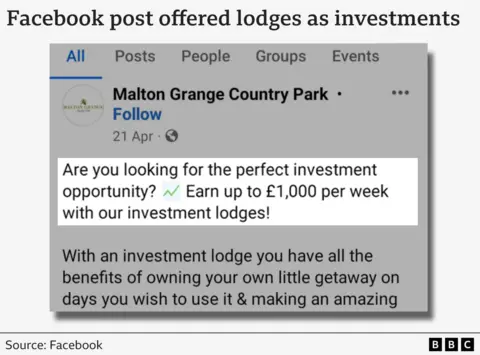**Caravan Owners Claim ‘Bullying’ by Holiday Park Operators**
In a troubling account of customer service and fair practices, many caravan owners in the UK have expressed feelings of being bullied by holiday park operators. This sentiment is underscored by the experiences of Asha and Jason Ross, who believed they had made a sound investment by purchasing a lodge in the picturesque Malton Grange Country Park for £125,000. Initially convinced that they were entering a profitable venture, their hopes quickly dwindled as they faced harsh realities.
The couple soon discovered that their lodge, which they had bought with the expectation of generating rental income, produced only two bookings over six weeks, yielding a meager £180. Faced with the unanticipated lack of profitability and steep site fee increases, the Rosses sought to sell the lodge back to the park. Despite their original investment, the buy-back price offered to them was disappointingly low, far beneath their initial outlay.
As they attempted to navigate this seemingly unfair situation and sought legal counsel, the couple encountered ominous threats from a park employee, which left them feeling vulnerable and harassed. Patrick O’Donovan, the park’s sales manager, allegedly called Mr. Ross in a furious tirade, suggesting consequences for their decision to take legal action, stating, “We know where you are, don’t we?” Such intimidation tactics have been reported by numerous other caravan owners as well.
In total, around 800 individuals have reached out to BBC News following earlier reports highlighting a lawsuit against holiday parks for possibly unfair practices. The phone calls and communications exchanged have revealed other distressing claims, including misleading promises about potential income, steep and unexpected increases in site fees, and discouragement from selling caravans back at their actual market values.
**The Backstory: A Misleading Purchase**
Asha and Jason Ross’s experience reflects broader issues permeating the caravan ownership market. When they bought their lodge, promotional materials from Prestige Country Parks claimed profits of up to £1,000 per week. Yet, authoritative advice from industry organizations, like the National Caravan Council (NCC), warns buyers to view such investments as depreciating assets. This fundamental discrepancy between expectation and reality is something many buyers fail to recognize.
Additionally, their journey turned even grimmer when they learned that the previous owner of their lodge had not, in fact, passed away—contrary to what O’Donovan had claimed. Tracking down the actual owner, Paul Gordon, revealed that he, too, had suffered from unfair treatment and was forced to sell his lodge at a significant loss.
Customer accounts reveal alarmingly similar narratives throughout the industry. The Thompson couple, for instance, purchased a static caravan for £66,000, only to see their site fees rise sharply from initial free offerings to demands for £7,000 within just three years. Feelings of distress were compounded as former owners across various parks reported instances where they felt pressured to make costly renovations with no alternative contractors offered, which only added to their financial stress.
**The Regulatory Gaps in the Holiday Park Sector**
Legal expert Hugh Preston KC, who is currently representing a cohort of caravan owners in litigation against holiday parks, described the industry as largely unregulated. While owners who use caravans as permanent residences benefit from the safeguards of the Mobile Home Act 1983, those who purchase static caravans purely for holiday purposes are often left vulnerable to private contract law, which provides almost no protection.
Thus, many buyers fail to read the fine print in their agreements, leading to situations where caravan parks can impose hefty fees and terminate agreements with minimal notice. This power imbalance has been illustrated further by the experience of individual owners who recently found that their former lodges, after being bought back at a loss, were re-listed for sale at significantly higher prices, leaving them feeling cheated.
**Addressing the Industry Concerns**
Despite the challenges facing these consumers, those within the NCC have expressed regret at hearing how many owners feel unjustly treated. They emphasize the necessity for informed decision-making and thorough examination of contracts ahead of any purchase. Meanwhile, it is evident that caravan parks benefitting from a largely unregulated environment may need to rethink their practices to ensure fair treatment for all owners. Reflecting on the collected testimonies, it’s clear that the industry could benefit from increased transparency and integrity in its operations to foster a more balanced and equitable marketplace for caravan ownership.



